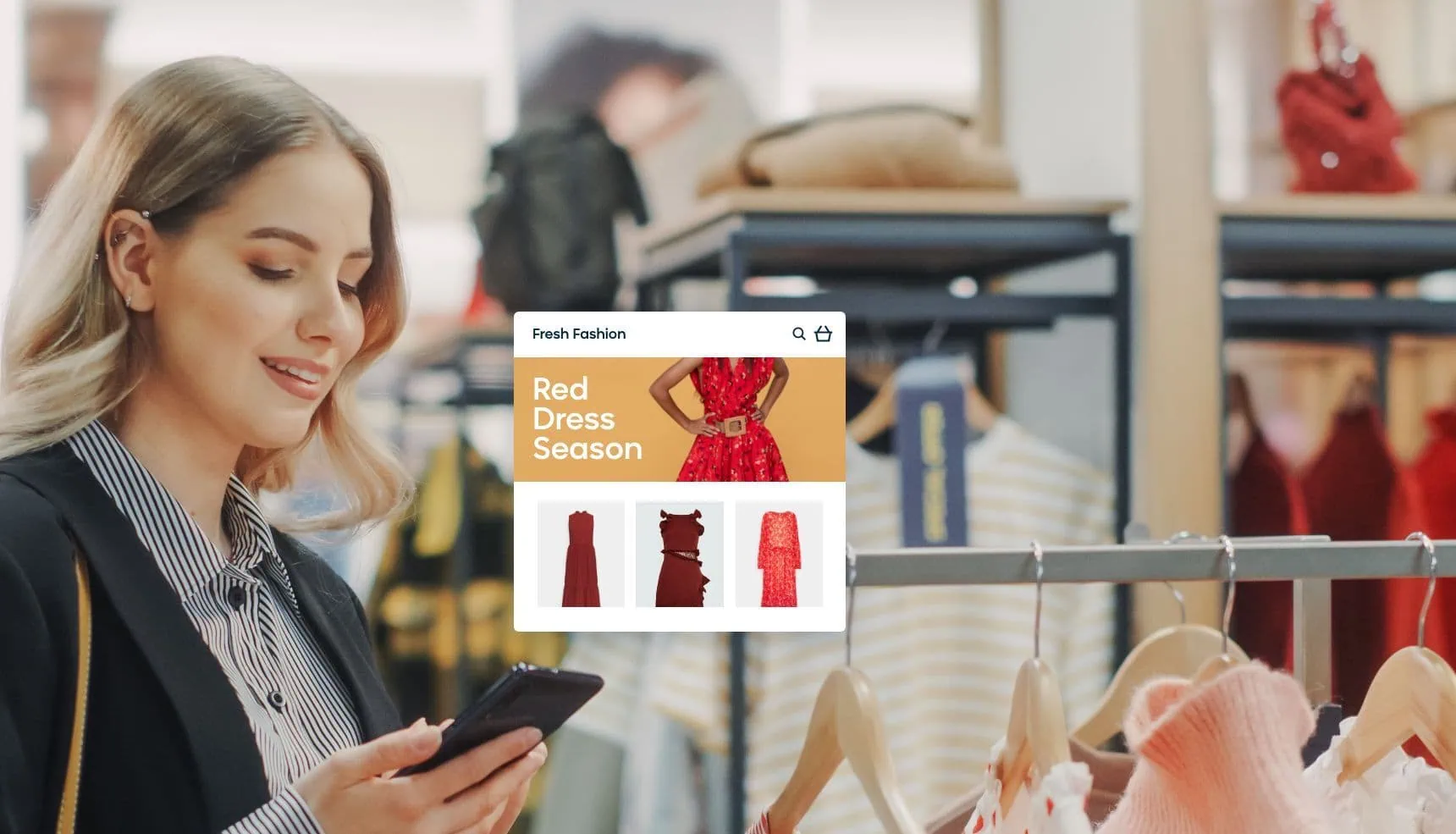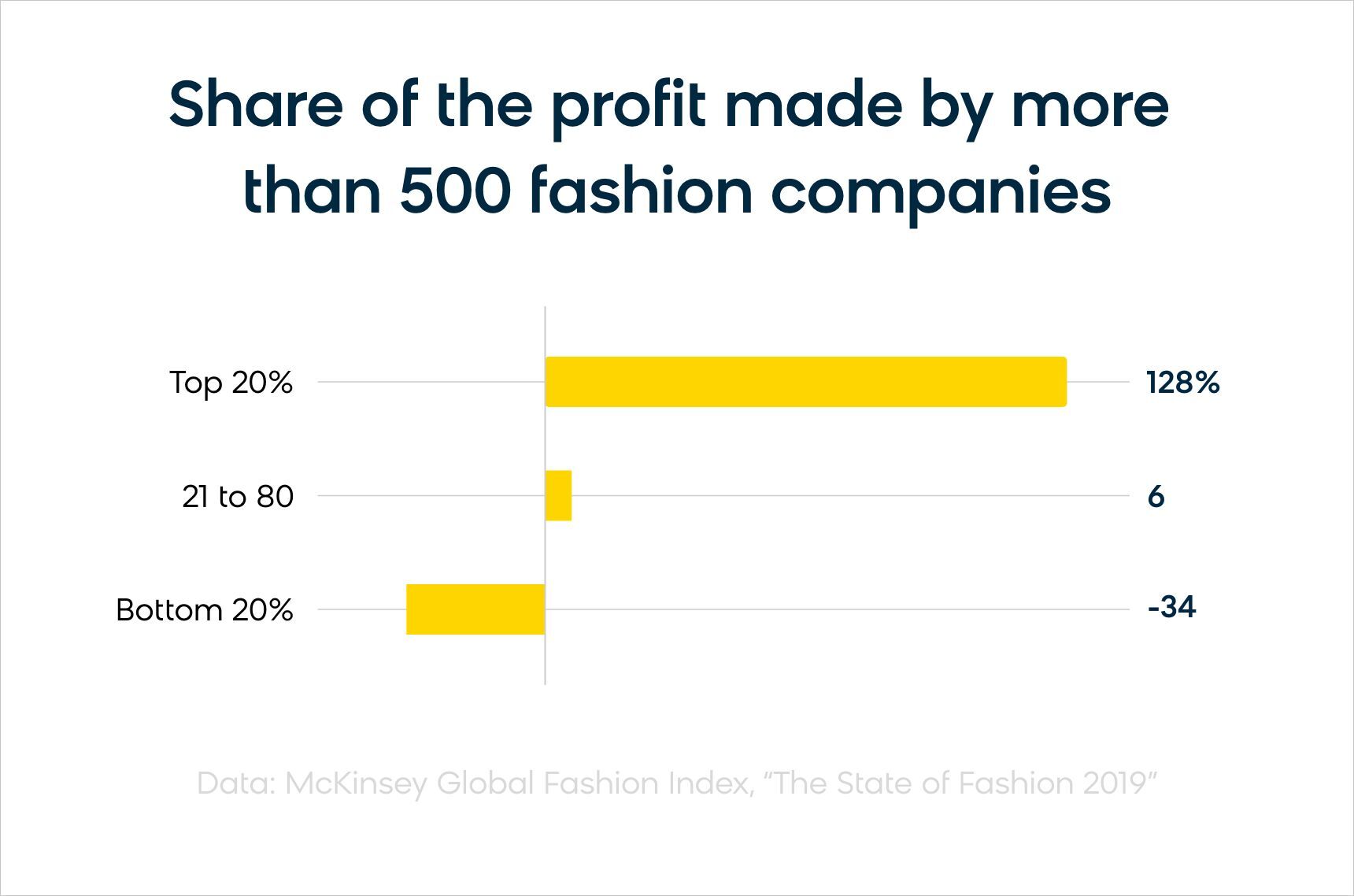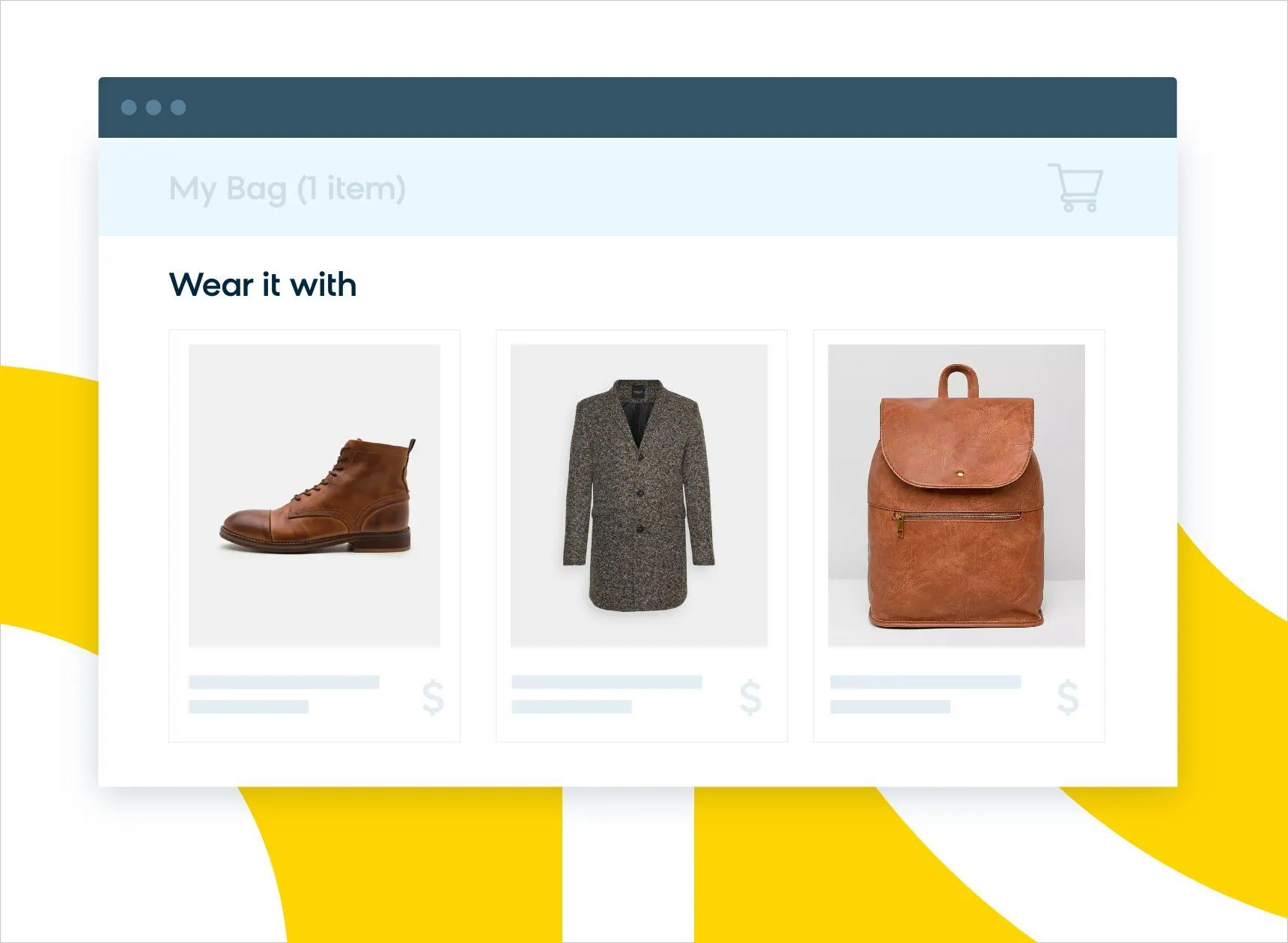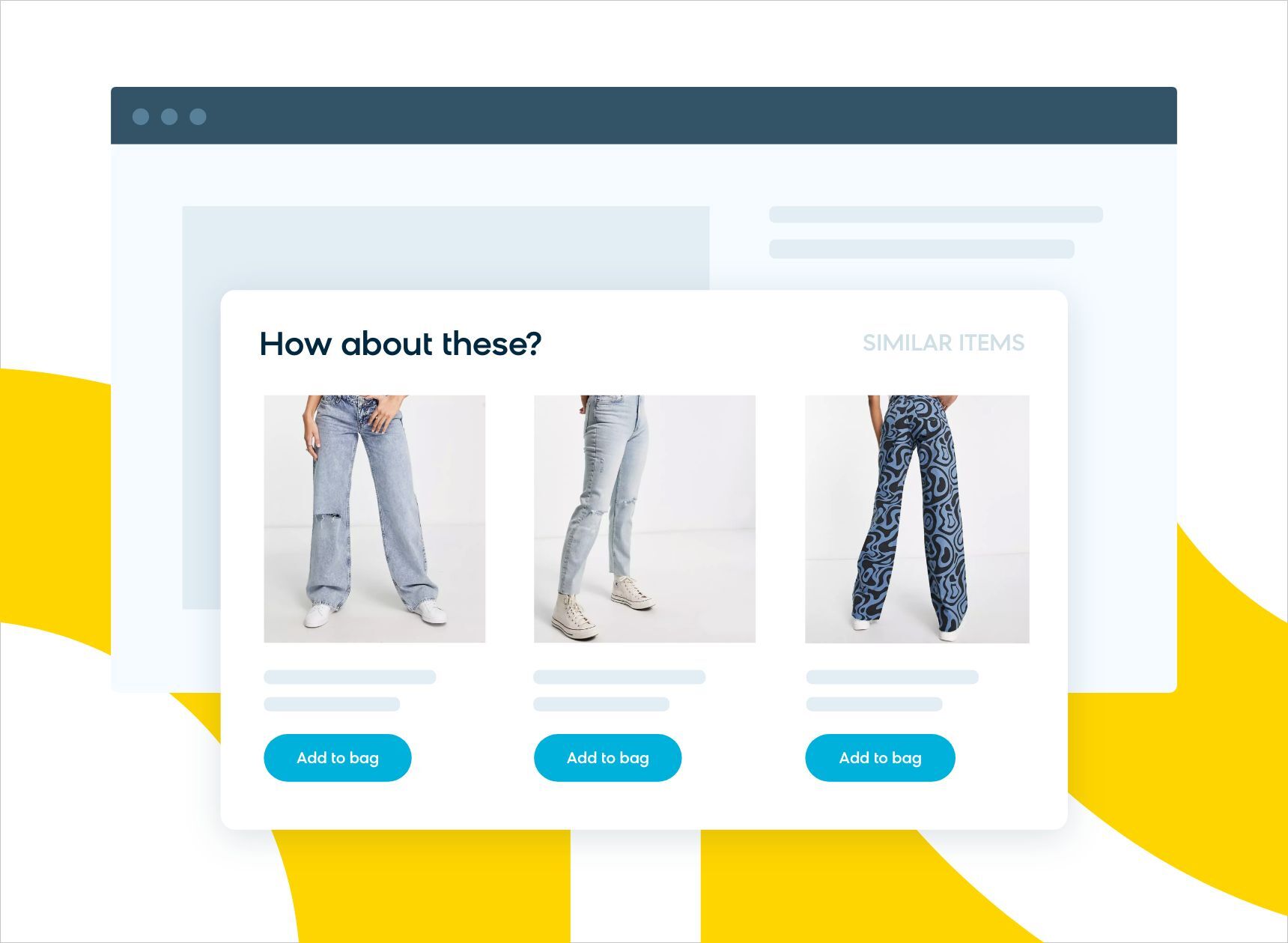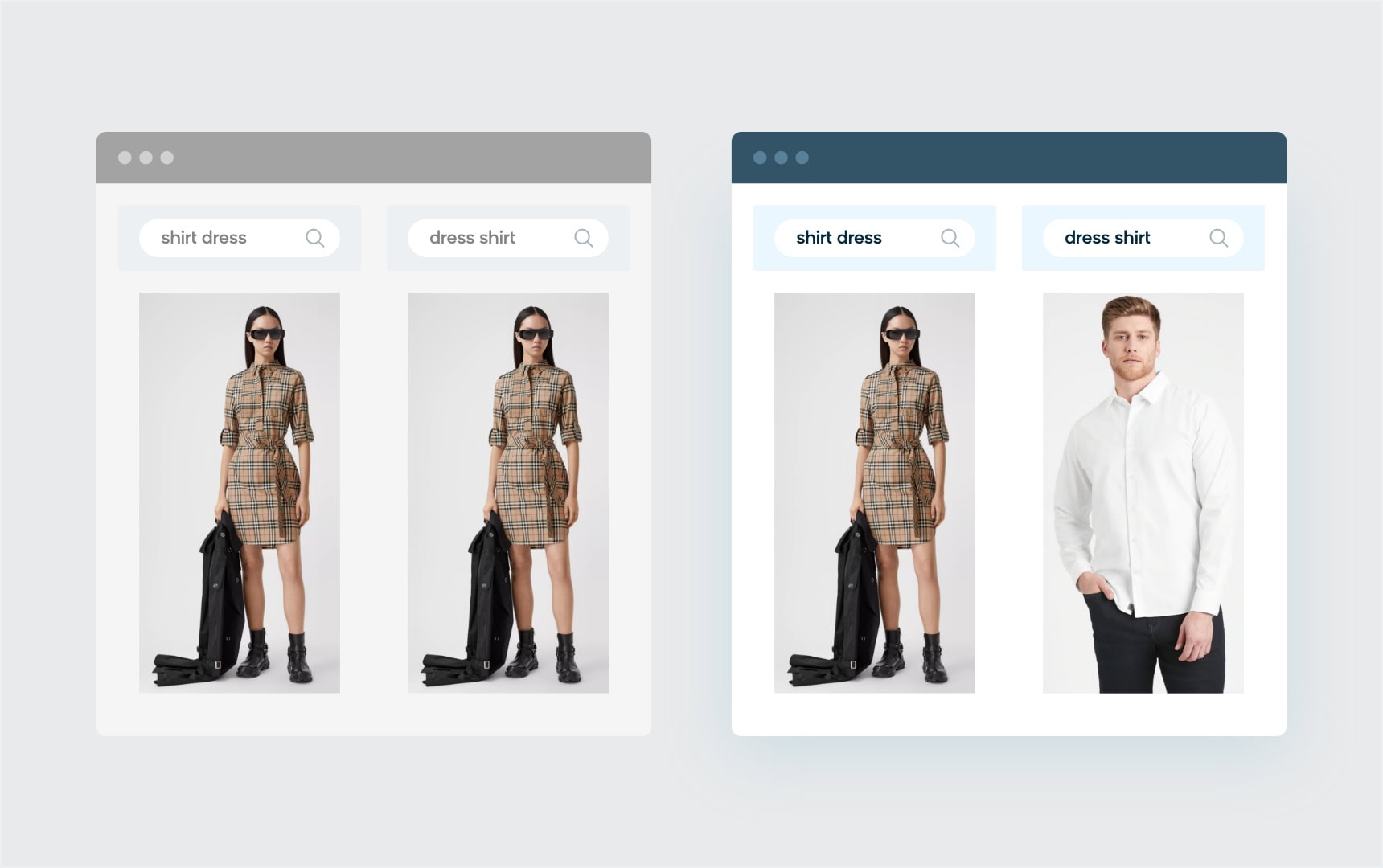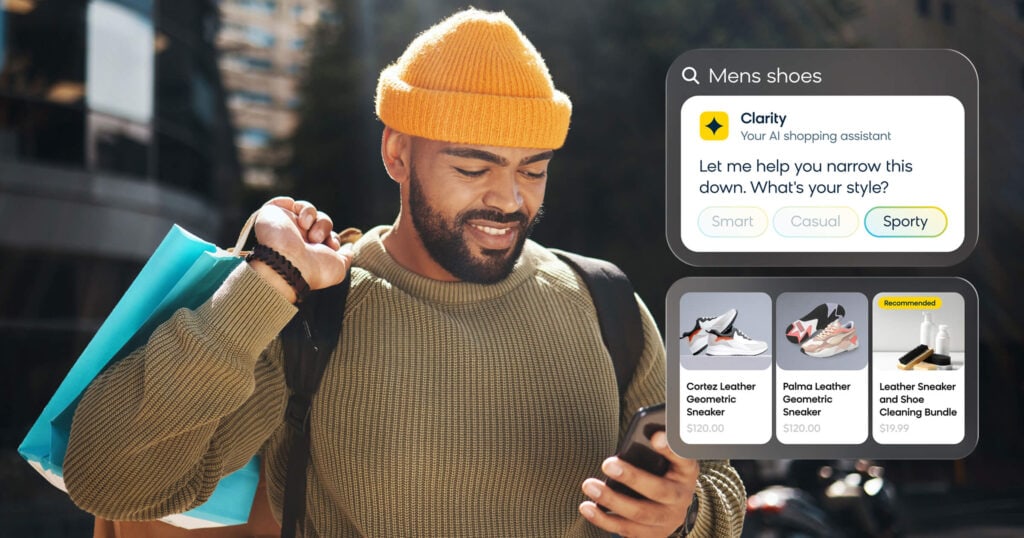Most retail businesses see artificial intelligence as a tool of the future. But in reality, AI is essential for addressing retail’s challenges in the here and now.
Here’s an overview of the current role of AI in the online fashion industry, and what we can expect from the groundbreaking technology in the future.
The State of Artificial Intelligence (AI)
For modern businesses trying to navigate the retail landscape, AI is imperative for success.
Artificial intelligence has a wider influence on contemporary business than most companies realize. Without the aid of AI, businesses can miss sales opportunities and lose efficiency within their teams. It’s an integral part of any strategy, not just ecommerce or digital efforts.
The Rapid Rise of Generative AI
Most people recognize AI by the popular prompt-and-response tools that have made recent headlines, like ChatGPT. This type of conversational AI technology has taken the world by storm, with early adopters praising the significant impact these AI tools will have on all aspects of modern life — from the art world and education to retail and conversational commerce.
But much of the buzz around generative AI comes from how foreign the technology seems at first glance. Most people view AI as a black box — you feed it data and you get great results, fast. And while this is true in some retail AI use cases, it doesn’t paint a clear picture of what AI is or does.
Read This Next: What Is Generative AI? Everything You Need To Know
How Does Generative AI Work?
It’s easier to understand AI’s use and application by viewing it as a tool for making predictions and projections, and doing so much faster than humans are capable of.
Most current AI algorithms make predictions and choices like humans would: they learn from historical data. Rather than being told specifically what to do every step of the way, generative AI is designed to create and innovate on its own, with minimal human intervention. The algorithms used in generative AI are trained on massive datasets and can create new, unique outputs based on the information that they’ve been fed.
And as we begin providing AI with higher quality data, its precision will dramatically improve.
Why AI in Fashion Is So Important
This pursuit of precision and speed is why artificial intelligence is such an exciting new tool. As data gathering and processing evolves and becomes more refined, artificial intelligence continues to play a bigger role for online businesses and retail stores.
And more and more industry experts are predicting that no area of life or business will be insulated from AI, especially the fashion industry. Valuable customer data, product data, and predictive analytics can be integrated and optimized like never before.
Today these technologies are disrupting every retail industry, not just fashion retail. Artificial intelligence no longer requires a high level of technical know-how to apply. It’s becoming more accessible with user-friendly platforms and straightforward use cases, making it an appealing and practical tool for retail businesses to adopt.
Here are a few ways that AI is actively changing the retail landscape.
Many Companies Are Incorporating AI
According to a recent study by IMRG & Hive, three-quarters of fashion retailers will invest in AI over the next 24 months. And this trend shows no sign of slowing down.
From big-box stores to direct-to-consumer brands, the AI-based online fashion store is becoming the go-to model for modern businesses.
And it’s easy to see the benefits of this movement towards AI. As modern businesses feel pressure to increase efficiency and output to meet customer needs and reach higher sales targets, the appeal of intelligent machine learning looks less like a perk and more like a necessity.
The Impact of AI on Online Retail Business
The ever-increasing scale and granularity of personalization in online fashion retail is impossible to manage without the assistance of AI and related automated processes.
The growing number of companies adopting these new technologies is raising the bar for service and personalization, which customers have learned to expect.
In recent years, dozens of well-known fashion retailers have faced the threat of bankruptcy, and most of the struggling companies shared a common trait: Failing to adapt to the modern need to create personalized, one-to-one experiences.
Today’s customer allows businesses to collect and use their personal data, and they expect an elevated customer experience in exchange. Lightning-fast service, relevant marketing, and personalization at every stage is the new norm.
They demand a customer journey that caters to their specific customer preferences, from recommendations and search results to landing pages and email campaigns. AI technology offers the scale and speed to make that happen.
Read This Next: Your Guide to Ecommerce Personalization
While investment may seem like a big step to take at first, AI in fashion is becoming absolutely necessary. And the gap between the businesses that adopt artificial intelligence and those that do not is only getting wider.
The McKinsey Global Fashion Index recently found that the top 20% of fashion businesses generated 144% of the industry’s profits.
That’s why implementing AI is now crucial. It helps companies streamline their costs and provide the kind of experience that shoppers expect, allowing companies that utilize AI effectively to compete with the major players.
How Do Customers Interact With Artificial Intelligence?
Knowing how your target audience prefers to engage with AI can help you determine how you incorporate artificial intelligence and automation into your customer journey. Today’s modern shoppers have a baseline of expectations, but different generations will embrace different levels of machine learning applications.
Gen Z is already highly accepting of AI, especially personalization. But older generations still tend to be wary of AI’s impact on their lives.
This distrust is largely due to misconceptions about AI as a concept, and focusing on the goal of artificial intelligence can go a long way in calming a shopper’s unease.
At the end of the day, it’s all about orchestrating a more enjoyable and seamless journey for customers — their satisfaction is the whole reason that AI is used in the retail environment.
Read This Next: The Ultimate Guide to Journey Orchestration
Again, your customers hold their shopping experiences to a high standard. No matter the generation, shoppers expect a lot from an online shopping experience:
- That it won’t waste their time
- That they will find products they want in their size
- That the product they want will be in stock, with a large variety to choose from
- That the experience will be personalized for them
This is exactly what AI can achieve. And that’s why it is quickly transforming the way customers shop for fashion products online.
How Can AI Be Used for Online Fashion Retail?
As we’ve already explained, AI in fashion goes way beyond ChatGPT — although the prompt-and-answer tool is a game-changer that fashion brands shouldn’t ignore.
Whether it’s a big, sweeping change to your supply chain management or a pivot in your customer loyalty strategy with automated customer service software, AI can be used to optimize every corner of your business. There really is no limit to how impactful AI technologies can be for retail companies.
Here are a few ways you can incorporate AI into your business.
Using AI for Customer Segmentation
Segmenting your customers into similar, targeted groups is an essential step of any marketing strategy. Using AI and machine learning models can help you identify your ideal audience and keep your customer segments as up to date as possible, ensuring your efforts are always relevant.
Take My Jewellery’s style profile test, for instance. This clothing and jewelry retailer based in the Netherlands gamified its data collection using a decision tree-based machine learning model, offering customers a series of choices to refine their personalized retail experience.
My Jewellery’s items are shown sequentially in the style profile test, prompting the customer to make a decision on each item presented. Customers simply click either the heart or the X to choose whether or not the item being shown is appealing to them or not.
After a decision on each product shown is made, My Jewellery is able to offer customers a personalized style profile filled with items that each individual customer will like based on their communicated style preferences. AI takes all the decisions they made, creates customer profiles, and connects them with the perfect items instantaneously.
It’s a simple concept that completely changes the retail experience for its shoppers and allows My Jewellery to constantly continue learning about its customers’ changing wants and needs.
Read This Next: My Jewellery Gets Creative With Zero-party Data
Using AI for Product Recommendations
One of the most common AI use cases for online fashion industry companies is product recommendations. Serving the latest fashion trends that your customers want is essential, and this type of algorithm can have a profound influence on the way your shoppers interact with your brand.
With an AI-powered product recommendation engine, you can connect all your data to create a truly seamless shopping experience.
A product recommendation engine filters and sorts your online store’s product offers on the basis of a set of rules. This process uses data about your products, such as the number of views, sales, or even reviews, to present equivalent products — allowing you to group items by most popular, most viewed, frequently bought together, and so on.
And when your engine is linked with your customer data, such as a customer’s most-viewed categories, products, and purchase history, it can rely on AI to identify the most relevant recommendations for your customers.
The ability to serve relevant and personalized recommendations can have extraordinary benefits for fashion businesses, and it provides a better user experience that fosters more customer engagement.
Using AI for Smarter Site Search
Most interactions that shoppers have with an online fashion retailer happen in the site search bar. It’s the tool customers trust to navigate your site and your products, so having enhanced search capabilities is an absolute must in the fashion industry.
That’s why smart site search and semantic interpretation capabilities are some of the most important services that AI offers to online fashion stores.
Using natural language processing, AI can extract meaning from the titles and descriptions of your product catalog and match them with the words and phrases from your customer’s search queries. Using the insights gained from this ongoing process, it can rank your products appropriately — balancing learned ranking data with semantic relevance.
With this type of AI in place, your search results become comprehensive, seamless, and much more meaningful. Your results can respond to a user’s intent as opposed to simply matching keywords to web pages — like knowing the difference between a “shirt dress” and a “dress shirt,” for example.
This application of self-learning AI is one of the most significant steps for a business in the fashion industry to take when building personalized digital experiences. If done right, your team will notice improved conversion rates, revenue per visit, average order value, customer lifetime value, and more.
Using AI To Predict Customer Purchases
The ability to anticipate a customer’s willingness to purchase is a huge advantage for retail businesses. AI can help you identify that customer behavior with predictive analytics and create actionable insights to use in your strategy.
Leveraging aggregated data from all your customers, AI can be used to predict whether certain customers are showing signs of making a purchase soon. By analyzing their engagement with your brand — such as the number of visits to product pages, the frequency of newsletter opens, etc. — artificial intelligence can learn which shoppers are likely ready to convert so you can adjust your marketing efforts accordingly.
Using AI for Purchasing Recommendations
One of the most common problems that retailers in the fashion industry face is overstocking. AI can be used for demand forecasting to predict which products should be purchased to meet the upcoming trends, and at what volume.
Brands can use machine learning to calculate the demand for a particular product, taking all relevant factors into account such as its sales history, your business’ current stock, market trends, and promotions. More advanced algorithms can even be used to predict supplier price changes and recommend ideal ordering times to lower the purchasing costs.
Using AI for Inventory Management
One particular application of artificial intelligence that fashion retailers see a lot of promise in is inventory management. The functions and results that AI offers are seemingly endless.
AI algorithms can be employed to optimize your supply chain networks and streamline packing, stocking, and fulfilling orders. It can be used to analyze and predict future orders, automate shipments and deliveries, and offer insights into the mountains of information extracted from your supply chain datasets.
In an area where the fashion industry needs precision and efficiency, AI is an invaluable inventory tool.
Using AI To Find Ideal Price Points
AI can even be used to keep your business one step ahead of your competition.
Using freely available data, AI can monitor your competitors’ prices and recommend ideal price points to maximize your revenue.
Using Agentic AI to Personalize Shopping Experiences
AI agents are at the cutting-edge of AI-powered retail experiences, and while this new technology is just beginning to embed itself in fashion business operations, it is poised to reshape online shopping as we know it.
Agentic AI is an artificial intelligence system designed to make autonomous decisions, which opens up a whole new world of customer engagement.
With AI agents that can analyze situations, develop solutions, and take action without human intervention, companies can leverage this technology to act as a personal shopping assistant for its customers — one that knows their individual needs, can communicate with them effortlessly, and shape their customer journey through real-time interactions.
AI agents like Clarity can be woven into the online shopping journey and offer customers the same level of personalized service that an in-store employee would, recommending similar products to what they are searching for, complimentary items that they’ve purchased in the past, and so on.
It’s a valuable and scalable method way to introduce conversational shopping into your customer experience, which can go a long way in building a lasting, profitable relationship with your shoppers.
What Is the Future of AI in Retail?
AI will undoubtedly grow in complexity, speed, and precision. It is destined to become embedded in our daily lives, creating an ever-increasing divide between businesses that utilize AI and those that don’t. Especially AI in fashion, which is an industry that exists on the cutting edge.
The key concept to remember is that artificial intelligence and algorithms exist to make your business strategy better. The role of AI in fashion is to save you time, deepen your understanding of your industry, and improve your bottom line.
And even as the applications of AI in the fashion industry expand, the effectiveness of your efforts always comes back to your data. With the right data, you can harness AI to achieve the level of contextual personalization that every modern business strives for — reaching the right customer, in the right place, at the right time.
How Companies Like Bloomreach Are Leading the Charge
Incorporating AI can be a daunting task, but Bloomreach makes the process simple, streamlined, and incredibly effective.
Bloomreach is THE agentic platform for personalization, offering all the AI-powered capabilities you need to build modern, impactful customer experiences.
With our powerful customer data engine and intelligent marketing automation, Bloomreach Engagement is the all-in-one marketing solution for your retail marketing needs. Our AI-powered personalization tools connect and activate your data, helping you create revenue-driving campaigns that serve the right message to your customers, when and where it counts.
Our search and merchandising solution, Bloomreach Discovery, offers a powerful combination of AI-powered site search, SEO, recommendations, and product merchandising. Backed by a commerce-specific AI engine that is powered with more than 12 years of data, it’s just what retail businesses need to build a sophisticated product discovery experience for modern customers.
Clarity, our AI shopping agent, is designed to elevate the shopping experience by offering real-time, personalized interactions as customers shop. With a conversational interface and an expert understanding of your customers and your products, Clarity is the next-gen tool your need to guide shoppers to the perfect purchase.
Ready to embrace the future of fashion retail? Learn what Bloomreach can do for you.



